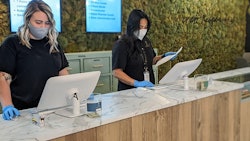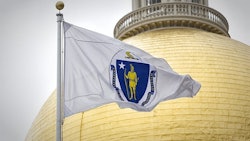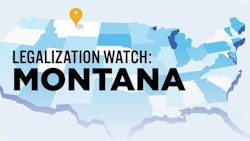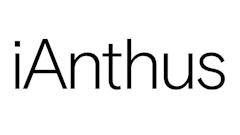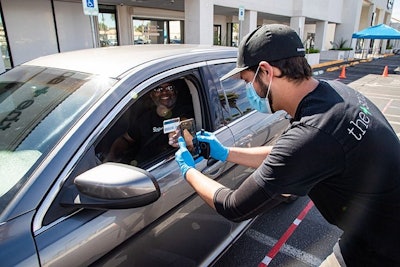
Nevada dispensaries could reopen their stores over the weekend starting May 9, after weeks of serving patients and customers exclusively through delivery to prevent the spread of COVID-19.
Cannabis retailers had just been able to offer curbside pickup the week before, as the emergency directives in the state began to relax, when Gov. Steve Sisolak announced May 7 that the first phase of reopening the economy would begin about a week earlier than expected.
Barber shops, nail salons, restaurants, retail stores and other businesses can also reopen with specific social distancing guidelines and conditions to protect employees and customers, but there are some additional restrictions cannabis retailers must follow that don’t apply to others.
Most businesses reopening must operate at 50% capacity or less and are to encourage customers to wear face coverings, for example. For cannabis stores, the maximum capacity is 50% or 10 people, whichever is fewer, and protective coverings are mandatory for customers.
“The [capacity limit] was very restrictive for us just because of the sheer size of how we operate,” says David Farris, vice president of sales and marketing for Planet 13, which operates a more than 16,000 square-foot dispensary inside its cannabis entertainment complex near the Las Vegas Strip and opened in-store sales Monday. “We’re able to keep everybody distanced properly. For them to issue that after the press conference was a little bit surprising to us … But again, we’re at the point where we just have to educate everybody as much as possible. This is something we have to follow strictly for us to continue to operate as a business in Nevada.”
RELATED: How Las Vegas' Planet 13 Shifted From Tourist Base to Locals Only
Cannabis dispensaries also had to submit their plans for reopening to the state’s Marijuana Enforcement Division and are still required to encourage customers to use delivery and curbside pickup.
Brandon Wiegand, regional general manager of The+Source, with a store each in Henderson and Las Vegas, said the Marijuana Enforcement Division approved the dispensary’s plans in less than 24 hours, and the questions were what you’d expect, such as what standard operating procedures (SOPs) the company was going to implement to protect staff and customers, how they were planning on enforcing those safety measures, and how they were going to train the team, among other requests about how they planned to adhere to the state’s social distancing and sanitation safety measures.

Although The+Source’s two store capacities are “substantially higher than 10 customers,” Wiegand says managing that has not been an issue.
“By and large, I think most customers are hesitant to come back in the store,” he says. Most people are still opting for curbside, and The+Source says it has been an efficient, effective way of dispensing cannabis to customers.
Planet 13 has also been a “big proponent of curbside all along,” Farris says, and will offer it as long as possible.
“We have to take this day by day and see how this evolves, but out of all the programs, we think this curbside is just extremely efficient,” Farris says. “We know our customers love that program.”
When The+Source started offering curbside pickup, customers largely chose that service over delivery. This past weekend, when stores reopened, Wiegand estimates 90% of customers ordered ahead of time via curbside or in-store pickup, with only about 5% opting for delivery and another 5% browsing in-store.
“It seems like the demand from customers is still there, it’s just been a challenge to continue to satisfy that demand,” Wiegand says. "Even though there is a pandemic, there's still the expectation that they are taken care of, and that's been our focus."
Similar customer preferences and shifts have been seen at other dispensaries, as well. In the first few days that Oasis Cannabis Dispensary in Las Vegas began offering curbside pickup, two-thirds of sales were from that service, says Andrew Glashow, president, COO and director of CLS Holdings, which stands for "Cannabis Life Sciences," the Nevada-based vertically integrated parent company of Oasis.
This past weekend when Oasis opened its doors, Glashow says the company saw 500 customers, with about 50% of sales from in-store purchases, 30% from curbside and 20% from deliveries.
“You have to keep in mind people have been cooped up for a long period of time,” Glashow says. “If they can get into their car legally and come into the cannabis shop, it gets people out of the house and lets people ‘do something’ rather than sit, looking outside your window waiting for [delivery.]” Plus, curbside pickup and in-store shopping are more convenient than delivery, he says.

While moving to curbside pickup was not a significant challenge for Oasis, shifting to delivery was.
Before the COVID-19 pandemic, 800 to 1,000 customers would visit Oasis, Glashow says. At most, deliveries accounted for just 3% of the business, and outside vendors handled that service.
After Gov. Sisolak instituted emergency shutdown orders for Nevada businesses that went into effect March 20 to curb the spread of COVID-19 in the state and mandated all dispensaries move to delivery only, Oasis, like the approximately 70 cannabis retailers in the state, had to make incredibly sudden, difficult changes in a highly regulated industry, Glashow says.
“We had to make a remarkable pivot, I will say one of the hardest things I’ve had to do professionally,” Glashow says. “Delivery is one of the most difficult aspects of the business. Being able to deliver and deliver timely and profitably is very, very difficult. … You’re almost losing control of your product when it goes out the door.”

Oasis was handling about 300 to 400 deliveries a day, with a group of about 50 drivers the company could call upon to deliver cannabis, Glashow says, when Gov. Sisolak opened up curbside pickup to dispensaries May 1.
Having more options than delivery-only is a welcome change for Oasis, as the service is expensive to offer.
“My view is that it’s going to cost you more than you thought to deliver, and it’s going to take you longer than you expected in order to get all of your systems in place. This pivot was very, very difficult,” Glashow says. “Part of that was because we were overwhelmed with the demand of our customers that wanted cannabis delivered. We did everything that we could.”
Wiegand echoes this sentiment about the challenges and expense of offering delivery, which both companies have a minimum for. Initially, The+Source did not have a minimum for curbside pickup, but implemented one after realizing it was not feasible to handle small orders and still meet demand.
“We have completely pivoted our business three or four times at this point. That’s a challenging thing to do from a leadership perspective,” Wiegand says, adding that the “very nimble and agile” team has made these changes possible even in the highly regulated cannabis industry. “It’s really challenging when you constantly have to change how you operate … Literally overnight having to rewrite SOPs and train the team, get everybody set up.
“We’re used to dodging and weaving the changing regulations, but this has been more intense than what we’ve dealt with in the past, but not foreign.”
One of the immediate lessons learned for Glashow during the COVID-19 pandemic is when transitioning to a new business model, don’t rush, he says. However, that can be difficult when the response to the pandemic to keep people safe necessitates that you change the way you provide cannabis to customers with 24 hours’ notice.
Plus, much of the economy in the state, especially Las Vegas, relies on sales from tourists, gaming and entertainment, Glashow says.
“[In March], you just turned the switch off. It didn’t filter off, it just went from on to off,” he says. However, Oasis’ customer base is 90% locals and 10% tourists, he says, putting the company in a good position and the opportunity to serve their already loyal consumers. Their customers, just as before the pandemic, primarily purchase flower, with 70 to 75% of sales being from that category alone, Glashow says.
“My own personal view of the world is in Las Vegas, it will be the first quarter of 2021 before you get another surge in tourism,” he says.
Farris says while Planet 13’s customer base was 85% tourists before the pandemic, they’ve seen a demand from local customers and quickly scaled delivery during the seven weeks the store was shut down. Moving forward, he hopes state officials consult with cannabis companies for feedback on how to safely operate before implementing new policies.
“We operate, on a monthly basis, anywhere from 9% to 12% of the state sales as a dispensary. You think that based on the sheer volume that we do that they would ask us for some insights on how to deal with this,” Farris says. “Our door is always open, … and we’ll continue to follow the rules and handle whatever ordinance is put in place. These are unique times that we’re in.”
Since the COVID-19 pandemic necessitated emergency orders to shutdown nonessential businesses and change the operations of those able to remain open, industry leaders to politicians have noted the extra challenge for cannabis companies, as they don't have access to the federal relief funds available to other industries. Wiegand says this is a perfect time to look at reform, especially 280E and access to banking.
“[We do] the majority of our transactions in cash because we’re limited to what payment options are out there,” Wiegand says, adding that contactless payment has been the preferred method to reduce transmission of the virus, but often is not an option for cannabis companies. “There’s little things this pandemic has highlighted and eliminated. The cannabis industry being deemed essential by the states but still considered illegal at the federal level without access to any kind of stimulus or support has been a challenge. It necessitates the need to for a discussion around what could that reform look like? How do we resolve 280E and how do we get access to banking?”










